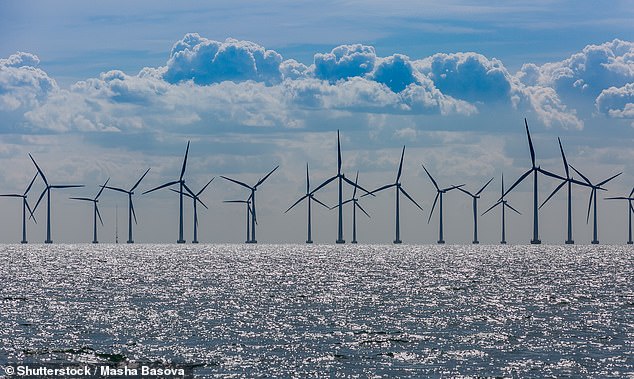Pension giant Aviva promises £32bn fund belonging to 2m savers will meet 2050 green climate target
- Aviva is the second major pension provider to declare new climate strategy
- State-backed Nest announced plans to switch investments of its 9m members
- Nest’s move affects more savers, but its fund is worth around £12.2bn
- Celebrity film director Richard Curtis and ex-BoE governor Mark Carney are campaigning to get all pension funds to follow suit
Pension giant Aviva plans to overhaul its auto enrolment ‘default’ fund to meet a 2050 net zero carbon target, and to put £5billion in climate-friendly investments in the next 18 months.
The commitment affects two million savers with pension funds worth a total of £32billion, and Aviva says it is exploring the feasibility of hitting the net zero target even faster, possibly by 2030.
A default fund is where a saver’s money goes if they don’t make any active choices about their pension investments, and the vast majority of workers end up using them.
Climate challenge: Pension giant Aviva promises £32bn fund belonging to two million savers will meet 2050 green climate target
Aviva is the second major pension provider to declare a new strategy to combat global warning, following an announcement by state-backed pension provider Nest over the summer.
Celebrity film director Richard Curtis and ex-Bank of England governor Mark Carney launched a Make My Money Matter campaign earlier this year, urging pension funds to use the £3trillion in UK retirement pots to take on climate change.
Curtis praised Aviva’s move, and called on all pension funds to match its leadership and commit to net zero, and a halving of carbon emissions by 2030.
The Government’s Pension Schemes Bill, which is currently going through parliament, will make it compulsory for pension schemes to take its climate targets into account, and disclose how they have done so to their members and the public.
Aviva has called on the Government to go further and pass a law forcing auto-enrolment default pension funds to achieve net-zero carbon emissions status by 2050.
The firm’s new investment strategy will affect two million people, compared to the Nest scheme’s nine million members.
However, the money involved is much greater as Aviva’s auto-enrolled pension savers have £32billion, while Nest’s have around £12.2billion in their pots.
Nest plans to plough 45 per cent or £5.5billion of that money into climate aware strategies, and will also ditch companies involved in thermal coal, oil sands and Arctic drilling within five years, unless they plan to phase out such activity.
Meanwhile, Aviva intends to invest more than £5billion from the ‘default’ pension funds it runs for employers into low carbon shares and climate transition strategies over the next 18 months, and says it will look to increase this level of investment after that.
STEVE WEBB ANSWERS YOUR PENSION QUESTIONS

Aviva says 95 per cent of pension scheme members are in default funds that have traditionally taken little account of climate change, but its research shows people support pursuing a net-zero target, particularly 25 to 34-year-olds.
A survey of 3,00 people aged 16-plus in August found 59 per cent think it’s important for pension funds to become ‘net zero’ by 2050.
This chimes with similar research carried out by Nest, and also by pension consultant LCP which found that most people want their pension funds to invest in businesses that treat staff well and care about the environment and fair trade.
‘The vast majority of savers are invested in a default fund – a fund which may take little account of climate change,’ says Lindsey Rix, chief executive officer of savings and retirement at Aviva.
‘The Government’s requirements for schemes to report on their exposure to climate change is a positive move, but we have a responsibility to go even further for our customers and the next generation of pensioners.
‘Climate change poses a significant risk to people’s pension savings and our research shows that people want pension funds to help tackle climate change and want the government to act.
‘This is particularly true for those due to retire in the 2050s.
‘We also want to progress towards the net-zero target as quickly as possible and we are exploring the feasibility of a 2030 target in line with the Intergovernmental Panel on Climate Change’s 1.5-degree pathway.
‘This is a challenging target, but we believe it is the right thing to do.’
The IPCC is a UN body that provides governments around the world with regular scientific assessments on climate change, including what might happen if global warming reaches 1.5 degrees above the pre-industrial level.
TOP SIPPS FOR DIY PENSION INVESTORS

